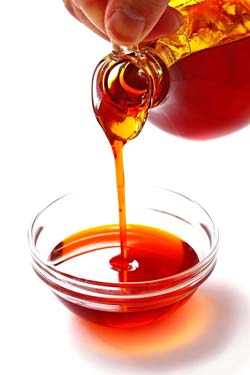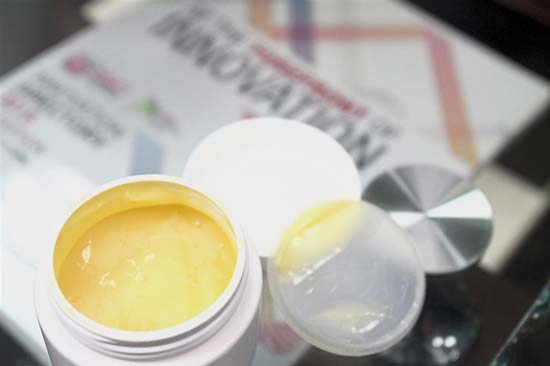



Reduction of inflammation
With her Masters student’s work fresh in her mind, Prof Lai wanted to see if they could develop an emollient for eczema with the anti-inflammatory properties of tocotrienols.
They ended up with a cream that has three anti-inflammatory ingredients: tocotrienols, tocopherols and carotenoids.
“The main one is tocotrienols. We have the full spectrum – the alpha-, beta-, gamma- and delta-tocotrienols. These isomers work together to reduce inflammation,” she explained.
While many other skincare products also contain Vitamin E in the form of tocopherols, Prof Lai noted that tocotrienols are 60 times more potent as an anti-inflammatory agent, compared to tocopherols.
Most tocopherols in creams come in their synthetic form of tocopherol acetate, which requires the body to do additional work in breaking it down into its active component.
“The enzymes in the body need to break it down. In most people, the enzymes are not that efficient. That’s why some forms of Vitamin E are not as effective, such as tocopherol acetate,” she said.
“Our tocotrienols, tocopherols and carotenoids, which are pro-Vitamin A, are basically from a natural source – red palm oil. This has the second-highest natural amount of tocotrienols in the world. We don’t separate and extract the tocotrienols, but use them in their natural form.”
In addition to the three anti-inflammatory ingredients, the cream Prof Lai and her team developed also contains Vitamin C.
“We found that there is a synergistic effect – when Vitamin C is added with Vitamin E, it enhances the properties of Vitamin E by four times, [meaning] that it becomes four times more effective,” she said, adding that Vitamin C is also good for wound-healing.

The process was not as simple as putting together all the ingredients. For example, while the natural form of Vitamin E is more potent and works better, it is also heat- and light-sensitive.
“[Through technology], we made it stable, able to withstand high temperatures and light so that [the cream] can last up to three years. At the same time, we can turn it into a water-soluble form. We realised that eczema patients, adults especially, don’t want to be slapping [on] creams that are really greasy. We wanted a cream that works, but is non-greasy.”
Another important consideration was that the cream – in particular, the anti-inflammatory ingredients – should penetrate the dermal layer of the skin, where the inflammation occurs.
“We made, or bioengineered, our bioactives – the tocotrienols, tocopherols, carotenoids and Vitamin C – so that they are nano-size, in order to penetrate the dermal layer. When you apply the cream, the bioactives get absorbed into the dermal layer, where they reduce inflammation and try to repair the skin from underneath. On the top layer, they try to protect [the skin] to prevent moisture loss. So it is a two-prong approach.”
The team was also careful to control the size of the bioactive compounds so that these would not unnecessarily enter the bloodstream.
The various technologies are unique and covered by five patents, two of which have been received. The patents are owned by Lipidware Sdn Bhd, a biotechnology start-up based in UPM. It was founded by Prof Lai, two of her postgraduate students and two friends from the business sector to develop and market the cream, which was launched in June 2017.
The cream is being used not only by eczema patients, but also by those suffering from psoriasis, burns and side-effects of chemotherapy on the skin.

Lipidware Business Development director Hishamuddin Mohamed said the company has received inquiries about exporting the cream. With this, though, comes the need to tweak the formulation to suit other climates. Prototypes have already been developed for potentially exportable versions.
The company also hopes to launch an ‘ultra-sensitive’ version of the cream which will contain ceramides.
“Basically, it’s skin-mimic technology. Even our seal on the upper layer of the skin will mimic the skin – the ceramides are identical to the skin structure,” said Prof Lai, noting that the cream will stay effective for 72 hours, even if the area where it is applied is washed.
The team has also developed baby shampoo and body wash gels that are suitable for eczema patients.
Source: The Star, Jan 3, 2018
This is an edited version of the article which can be viewed at: https://www.star2.com/health/2018/01/03/
eczema-inspired-anti-inflammatory-moisturising-cream/
Pages : 1 2